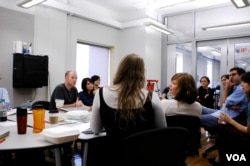#1
The Best Advice I Ever Got For Writing in English: “Treat the Professors Like Idiots”
By Sunny Peng
Read it: "The Best Advice I Ever Got For Writing in English: 'Treat the Professors Like Idiots'"
"In my first semester," Sunny explained, "I would always receive comments on my papers like, 'Try to be more clear (explicit),' no matter how clear and explicit I thought my papers were."
A savvy teaching assistant eventually helped her figure out the problem:
My high school Chinese teacher always reminded us to not tell readers everything, but rather to leave space for their "reconstruction" of our words. This does not work in the U.S., where you are expected to be very explicit in making your arguments and not make assumptions without fully explaining them.
Or, as her TA put it, in what Sunny described as a "very blunt and funny way,” she needed “to treat the professors like idiots, and explain everything very clearly to them in my essays."
This idea generated a lot of discussion among our readers. Some commenters suggested that Americans may be trying to avoid critical thinking, but Sunny countered that “critical thinking is one of the most important things I have been learning from Americans.”
Commenter Dana eventually explained, "It is precisely because they *do* apply critical thinking skills to what they read that most Americans tend to prefer that writing be more direct."
Read it: "Dana Explains Why American Professors Prefer Straightforward Essays"
Dana continued:Americans are culturally predisposed to be skeptical of non-fiction writing- especially journalism- that takes anything but a very straightforward and objective approach.
To use a common American phrase, they “tell it like it is” and in the end still require the reader to interpret what the intended message is…but Americans want to do that after getting all the facts in as plain and unvarnished a manner as they can, and tend to see any room left for interpretation in the original presentation as something to be concerned about, since that kind of vagueness is often used to justify all manner of tricks and scams.
Sunny’s entire academic experience changed thanks to her newfound understanding of American essay writing. "[A]s a liberal arts major," she noted, "my life is always occupied with writing — lots and lots of writing," so it was vital to know how to do it right.
In fact, home assignments are a huge part of any student's life, regardless of their major, as Anna pointed out in a fascinating conversation with her friend Dmitry about the quirks of American academics – a conversation that became one of our thought-provoking posts of the year.
"In my three years at a Russian university, I did less reading assigned as homework than I have to do in one year here at my American college," Anna observed.
Read it: "Two Russians Discussing American Education"
Dmitry agreed that he was "was surprised by the amount of home assignments for classes in the U.S. A student here spends more time doing independent work than attending class …"Despite the heavy workload, however, Anna and Dmitry both observed that the American academic environment can feel uncomfortably lax and informal.
They dissected attitudes towards:
- Eating in class
"I will never forget when in my first year in the U.S. a girl sat next to me in the front row of a morning class and, as the professor was speaking, put her breakfast on the table and started eating." – Anna;
- Proper classroom attire
"I don’t want to sound rude, but around half of the dressing choices of people here in Iowa would be totally inappropriate in my Russian university." – Dmitry;
- and grading policies
"I see it is very common for students to try and explain to the professor what he or she might have not understood when grading." – Dmitry.
"In Russia, we just come to school on the first day of classes to find that everything has already been arranged for us." But in the U.S.:
They pick courses, shape their entire education experience, and assume responsibility for their decisions. They are responsible for meeting all kinds of deadlines, like deadlines for registration, dropping courses, declaring an ungraded option and so on.
And they are responsible for their own performance in class - it is up to each student to do what they need to do to succeed. As Anna pointed out in a previous post, no one is going to call their parents if they do poorly.
Read it: "10 Ways Being a Student in the US is Different Than in Russia"
For Sunny, this meant putting her TA's essay-writing advice into practice."It is easier said than done," she concluded, "and I am still working on it, but I’m now getting through classes with no problem, and one of my professors even teased me, 'How can you write so well? You are not even a native English speaker.'"
Other top posts of 2012:
#5: Navigating and Defeating Negative Stereotypes
#4: The Surprising Links Between Food and Identity
#3: The Cultural Nuances of Language
#2: Keeping Standardized Tests in Perspective





